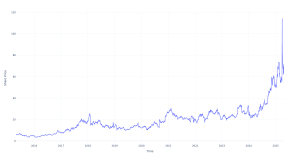
Home sales fell sharply in March and weekly mortgage applications plunged as high interest rates and economic uncertainty stifled demand as the spring home-buying season got underway.
The Details: Sales of previously owned homes in March fell 5.9% from February to 4.02 million units on a seasonally adjusted annualized basis, according to data from the National Association of Realtors.
Read Next: Trump Administration To Resume Collections On Student Loans: 5 Million Borrowers In Default
“Home buying and selling remained sluggish in March due to the affordability challenges associated with high mortgage rates,” said Lawrence Yun, NAR’s chief economist.
“Residential housing mobility, currently at historical lows, signals the troublesome possibility of less economic mobility for society,” Yun added.
Mortgage demand fell sharply last week, with total application volume down 12.7% compared with the previous week, according to the Mortgage Bankers Association’s seasonally adjusted index.
The average contract interest rate for 30-year fixed-rate mortgages increased to 6.90% from 6.81%, reaching the highest rate in two months. Rates have climbed almost 30 basis points in just two weeks.
“Similar to the previous week, economic uncertainty and rate volatility impacted prospective homebuyers,” said Joel Kan, vice president and deputy chief economist at the MBA.
The rate increase affected refinance applications dramatically, causing a 20% decrease in volume from the previous week.
Lower Rates? President Donald Trump has pressured the Federal Reserve to lower interest rates, but a recent report from Redfin Corp. RDFN says that if the Fed were pressured into lowering rates too soon, mortgage rates would likely increase.
“If the Fed cuts rates at the behest of the White House, investors will perceive that the Fed is not doing its job and may anticipate that inflation will only get worse. That means rates need to be higher in the long run,” wrote Chen Zhao, Redfin economist.
Zhao suggested the best way to bring down mortgage rates would be to address the underlying drivers of inflation, such as the shortage of housing and recent changes in trade policies.
Read Next:
Photo: Shutterstock
Market News and Data brought to you by Benzinga APIs
© 2025 Benzinga.com. Benzinga does not provide investment advice. All rights reserved.
